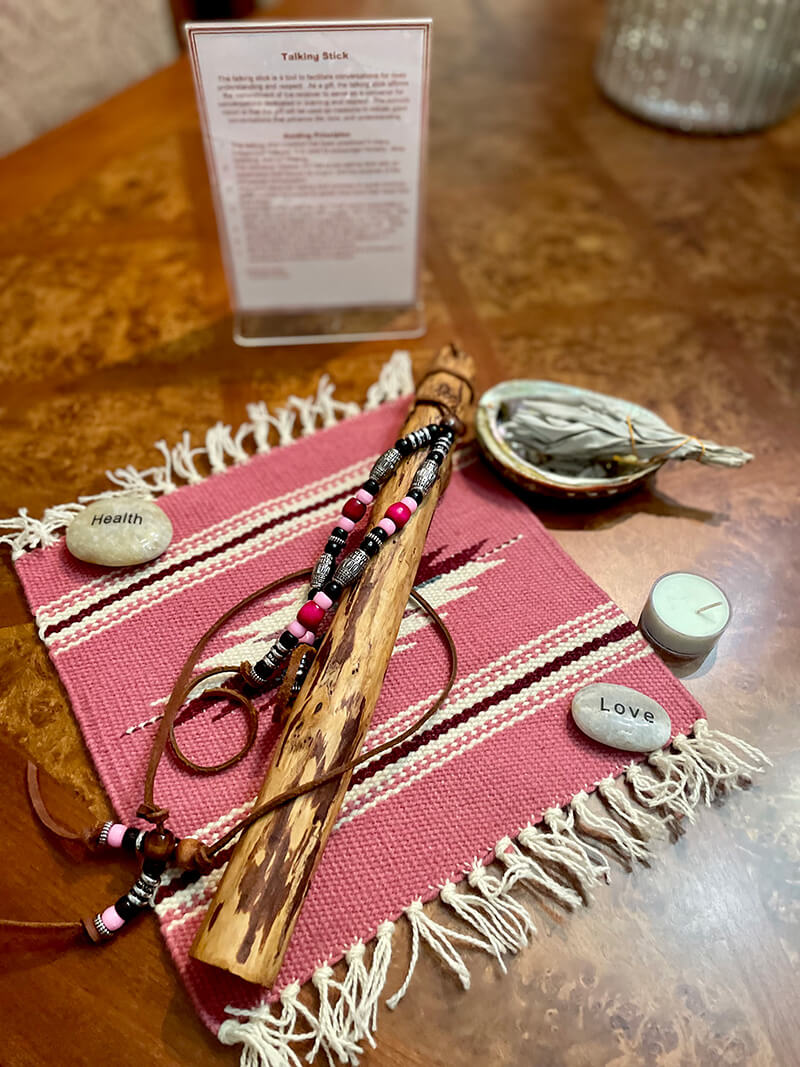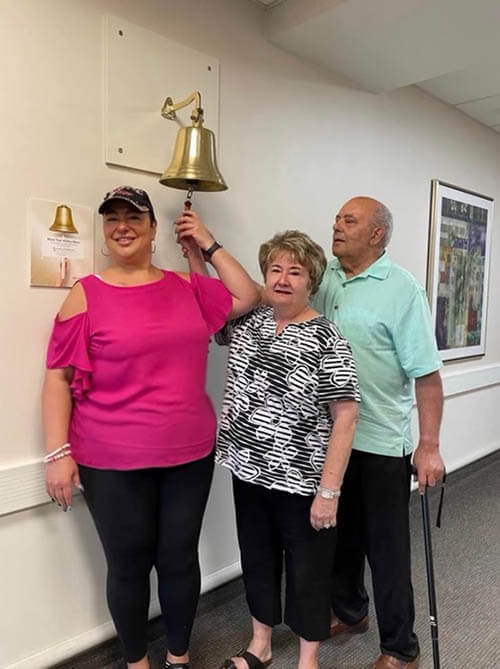Native American Sonya Villegas was at a powwow for her Coharie Tribe when she noticed something in the mirror. It was a large lump on her breast she could no longer ignore. Since she didn’t have insurance, she didn’t know what to do. If she got diagnosed with cancer, how would she afford treatment? She also didn’t want her family to worry.
A month later, Sonya contacted the American Cancer Society, who referred her to the Breast and Cervical Cancer Control Program. The program helped her connect with Dr. Katherine Ansley, clinical leader of the breast medical oncology team at Atrium Health Wake Forest Baptist.
Ansley arranged for the testing Sonya needed and diagnosed her with stage 3A breast cancer. A BRCA gene mutation test revealed that her cancer was not hereditary.
“When I met with my care team, I immediately felt at peace,” explains Sonya. “It’s a strange thing to receive such a serious diagnosis. I believed Dr. Ansley genuinely cared about me. No matter the outcome, she truly wanted me to succeed. I felt comfortable with her – I trusted her.”
Sonya had multiple areas of tumor detected in her breast, the largest of which was the size of a grapefruit. Testing also revealed she had four cancerous lymph nodes. Her care team had to move quickly based on the size of the tumor and the number of lymph nodes involved.
Comprehensive cancer treatment
Sonya had a mastectomy and 28 lymph nodes removed from her left arm. Four of her lymph nodes were enlarged due to the cancer cells. Sonya had a smooth recovery from surgery without the need for any pain medicine.
Although Sonya’s surgeon was able to remove all the cancer, Ansley recommended a more complex form of chemotherapy – in case even a single cell was left in her bloodstream. Sonya had a chemotherapy port installed to prepare her for 16 IV sessions. During chemotherapy, Sonya got to know Ansley and Ashlyn Hedgecock, physician assistant with Wake Forest Baptist.
“Every time I went to an appointment and expressed a concern, Dr. Ansley would repeat it back to me,” says Sonya. “Sometimes I didn’t even have to finish a sentence and she knew how I felt. She was very patient and thorough, which helped put me at ease. Dr. Ansley and Ashlyn had great communication throughout my cancer treatment and made me feel supported.”
Sonya also had 25 radiation treatments, which were targeted at the breast and lymph node areas.
Coping with treatment side effects
Following surgery, Sonya developed lymphedema and cording. Because of the buildup of lymph fluid from the lymphedema, Sonya had swelling in her left arm. Cording caused pain and tightness in her left arm and shoulder, making it impossible for her to lift her arm above her shoulder. Also known as axillary web syndrome, cording commonly occurs after lymph node surgery and causes thin or thick bands to form under the skin of the inner arm.
Sonya started physical therapy to treat her lymphedema and cording. She also received education on how to live with the effects of lymphedema. Her physical therapy team taught her how to use breathing techniques and massage to keep the lymph fluid from building up in her arm. While she still feels tightness in the cords in her arm, she can now lift her arm above her head.
Overflowing positivity
“You rarely meet someone so positive and joyful while going through an incredibly tough time,” Ansley says. “And yet I would leave inspired every time I saw her in the clinic because she would radiate this effusive joy. I think it came from deep inside of her.”
“As cancer doctors, we know that having a positive attitude can make a huge difference in your treatment outcome,” Ansley continues. “It seems that good mental health can help minimize your other physical side effects. And that's what I saw with Sonya. She just exuded this joy that left everyone around her feeling inspired.”
Support, healing and open communication
According to Ansley, Sonya benefited from her “wonderful support system, which kept her motivated and positive throughout her entire experience.” Her support team includes her family, friends, native community and Yorkie Mia. Sonya’s mom accompanied her to every oncology appointment. Members of the Coharie and Lumbee tribes helped Sonya prepare for the side effects of cancer treatment and made her feel honored.
Sonya believed that her hair was sacred and helped connect her with her ancestors. It brought her great comfort and kept her company. At the time of treatment, her hair had grown to 25 inches long. Her intense chemotherapy treatment meant that she would lose her hair.
Sonya decided to be proactive in preparing to lose her hair. Her closest friends spent hours braiding her hair into tiny braids. “Instead of being something devastating, it was cathartic,” she says.

Around the same time, Sonya’s cousin made her a talking stick, which is used to encourage healing, cleansing and honest conversation. During the Talking Stick Ceremony, the stick is passed around to each person present. The person who holds the stick is encouraged to express themselves openly without being judged or interrupted. Her cousin added pink beads to the stick to represent her breast cancer.
Sonya explains, “You have to be honored by one of the elders to receive the talking stick. It’s significant because they recognize you are healing and encourage positivity.”
Ansley recalls Sonya bringing the talking stick to her first chemotherapy treatment.
“It represented these positive words of affirmation, confirming that she could get through this and succeed,” Ansley says. “With her type of breast cancer, I think that was really important.”
Ringing the bell together

Everyone who finishes chemotherapy at Wake Forest Baptist has the opportunity to ring a bell to celebrate the milestone. Sonya invited her mother, Ansley and Hedgecock to ring the bell with her.
“Sonya was the first patient to invite me to ring the bell with her,” says Ansley. “Throughout her cancer journey, she surrounded herself with people who helped her remain positive. It was such an honor to stand next to her at that moment and throughout her entire experience.”
Sonya credits her care team and her mother with doing all the hard work needed to help her heal.
“As a cancer patient, you hear everyone say you’re doing a good job,” Sonya explains. “But early on, it clicked with me that my mother, Dr. Ansley and the rest of my care team were the ones doing the hardest job. Of course, I have to show up – I’m fighting for my life.”
She continues, “But they’re showing up because they’re trying to support and help me. It’s a much harder job. I wanted Dr. Ansley, Ashlyn and my mom to ring the bell with me because I felt like it was their accomplishment.”
Ongoing treatment and encouraging others
Sonya’s ongoing treatment is as strong and proactive as possible to try to keep her advanced form of cancer from returning. She is also participating in two clinical studies to see how her gut and heart have been affected by the treatment.
“It’s been a challenging year – and I’m not finished with it,” explains Sonya. “But I believe that I’m doing so well because of my positive attitude and the support of my care team. My goal is to live as normally as possible going forward.”
Sonya advises others facing a similar health crisis to take the time needed to grieve.
“But don’t stay in that dark place,” she says. “Find things throughout your journey that can lift you up – even if it’s setting a goal to walk in a garden. Do everything you can to stay away from the negativity of cancer.”
Early detection saves lives
Sonya is passionate about promoting breast cancer awareness and telling others about the benefits of the Breast and Cervical Cancer Control Program. She knows how vital it is to not take good health for granted.
“It’s important to know your options,” she says. “Don’t hold back from getting tested and diagnosed. Early detection can save your life!”
Learn more about compassionate breast cancer care at Wake Forest Baptist.
